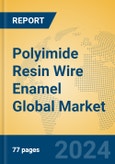Ningbo Boya Poly, after 2023 financing, plans a 6000-ton polyimide slurry line by 2024, with corona-resistant enamel validated by EV makers. Applications include automotive, energy, industrial, transportation, household appliances, and others. Innovations target corona resistance for EVs and high-voltage durability. Challenges include VOC regulations, high costs, and raw material volatility, yet EV and renewable energy demand drive growth.
Market Size and Growth Forecast
The global Polyimide Resin Wire Enamel market is projected to reach USD 0.8-1.2 billion by 2025, with an estimated compound annual growth rate (CAGR) of 6% to 8% through 2030. Growth is driven by EV motors, renewable energy, and industrial automation.Regional Analysis
- North America expects a growth rate of 5%-7%. The U.S. leads in automotive and industrial applications, with Canada focusing on energy.
- Asia Pacific anticipates a growth rate of 7%-9%. China’s Ningbo Boya Poly and Japan’s UBE Corporation drive EV and appliance demand. India’s industrial sector contributes.
- Europe projects a growth rate of 5%-7%. Germany and the UK focus on automotive and transportation, with sustainability shaping demand.
- Middle East and Africa expect a growth rate of 3%-5%. The UAE’s industrial projects grow, but adoption lags.
- South America anticipates a growth rate of 3%-5%. Brazil’s automotive sector supports demand.
Application Analysis
- Automotive: Projected at 7%-9%, automotive, led by Evonik, dominates with EV motors. Trends include corona-resistant enamels.
- Energy: Expected at 6%-8%, energy, with UBE Corporation, grows with transformers. Trends focus on renewable energy.
- Industrial: Anticipated at 6%-8%, industrial, led by I.S.T Corporation, grows with automation. Trends include high-voltage coatings.
- Transportation: Projected at 5%-7%, transportation, with PI Advanced Materials, grows with rail systems. Trends focus on durability.
- Household Appliances: Expected at 5%-7%, appliances, led by Fu Pao Chemical, grow with compact motors. Trends include efficiency.
- Others: Anticipated at 4%-6%, niche uses like aerospace grow with Ningbo Boya Poly’s offerings.
Key Market Players
- Evonik: A German firm, Evonik develops polyimide enamels for EVs.
- UBE Corporation: A Japanese company, UBE focuses on energy applications.
- I.S.T Corporation: A Japanese firm, I.S.T supplies industrial enamels.
- PI Advanced Materials: A South Korean company, PI develops transportation enamels.
- Fu Pao Chemical: A Taiwanese firm, Fu Pao focuses on appliances.
- Elantas: A German company, Elantas supplies automotive enamels.
- Ningbo Boya Poly: A Chinese firm, Ningbo specializes in corona-resistant enamels.
Porter’s Five Forces Analysis
- Threat of New Entrants: Moderate. Technical barriers deter entry, but firms like Ningbo Boya Poly enter with financing.
- Threat of Substitutes: Low. Low-VOC coatings compete, but Evonik’s polyimide retains an edge in heat resistance.
- Bargaining Power of Buyers: High. EV makers switch suppliers, pressuring UBE Corporation for pricing.
- Bargaining Power of Suppliers: Moderate. Chemical suppliers influence costs, but Elantas’s scale reduces dependency.
- Competitive Rivalry: High. Evonik and Ningbo Boya Poly compete on performance and innovation.
Market Opportunities and Challenges
Opportunities
- EV Expansion: Motor demand boosts Evonik’s sales.
- Renewable Energy: Transformers drive UBE Corporation’s growth.
- Industrial Automation: High-voltage enamels favor I.S.T Corporation’s expansion.
- Corona Resistance: EV innovations align with Ningbo Boya Poly’s R&D.
- Emerging Markets: India’s industrial sector supports Elantas’s growth.
- Miniaturization: Compact motors boost Fu Pao Chemical’s adoption.
- Sustainability: Eco-friendly formulations enhance PI Advanced Materials’s share.
Challenges
- VOC Regulations: Environmental laws pressure Evonik’s costs.
- Raw Material Volatility: Chemical prices affect UBE Corporation’s margins.
- Substitute Coatings: Low-VOC alternatives threaten Elantas’s share.
- Market Saturation: Mature markets slow I.S.T Corporation’s growth.
- Supply Chain Issues: Logistics disrupt Ningbo Boya Poly’s delivery.
- Technological Barriers: Corona resistance challenges Fu Pao Chemical’s innovation.
- Economic Volatility: Industrial demand affects PI Advanced Materials’s growth.
This product will be delivered within 1-3 business days.
Table of Contents
Companies Mentioned
- Evonik
- UBE Corporation
- I.S.T Corporation
- PI Advanced Materials
- Fu Pao Chemical
- Elantas
- Ningbo Boya Poly








